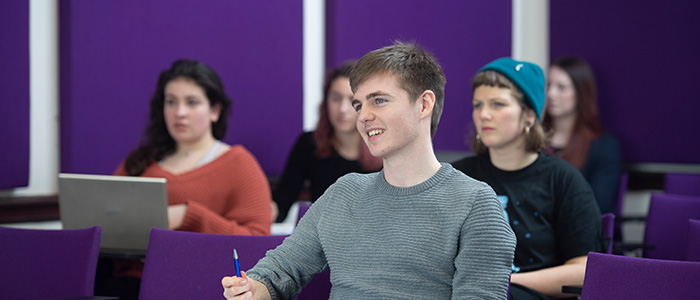Systems Biology PhD/iPhD/MSc (Research)

Systems biology emphasises a multi-level, integrative approach to understanding how living organisms work. With our close links to the polyomics facility, we apply a full range of post-genomic technologies to aid our understanding.
- PhD: 3-4 years full-time; 5 years part-time;
- MSc (Research): 1 year full-time; 2 years part-time;
- IPhD: 5 years full-time;
Research projects
+++
Comparative functional genomics for insect control
Supervisor: Julian Dow
Outline & aim: Insects are the most successful class of life on earth, with more species than all other organisms combined. It’s inevitable that insects impinge on human life in both positive (e.g. pollinators) and negative (disease vectors, destroyers of crops) ways. The availability of genomes for ever increasing numbers of insects allows us to understand insect function more generally than has ever been possible, and may allow us to devise new, more specific –and thus greener- methods of insect control for food security.
This project will draw on our established skills in insect physiology and genomics (e.g. flyatlas.org) to increase our understanding of fundamental processes, like renal function, that are mission-critical to survival. The student will join a large, vibrant research group, funded by the BBSRC, NIH and Horizon 2020, and will be trained in a wide range of contemporary skills, listed below.
Techniques:
- Functional genomics: transcriptomics, microarrays, RNAseq, metabolomics, informatics.
- Genetics: Drosophila genetics, transgenics, crosses, conditional expression.
- Physiology: microdissections, functional assays
- Imaging: microscopy, confocal microscopy, immunofluorescence, reporter genes
References
- Beyenbach et al. "The developmental, molecular, and transport biology of Malpighian tubules." Annual review of entomology 55 (2010): 351-374.
- Robinson et al. "FlyAtlas: database of gene expression in the tissues of Drosophila melanogaster." Nucleic acids research 41, no. D1 (2013): D744-D750.
- Cabrero et al. "Chloride channels in stellate cells are essential for uniquely high secretion rates in neuropeptide-stimulated Drosophila diuresis."Proceedings of the National Academy of Sciences 111.39 (2014): 14301-14306.
- Efetova et al. "Separate roles of PKA and EPAC in renal function unraveled by the optogenetic control of cAMP levels in vivo." Journal of cell science 126, no. 3 (2013): 778-788.
- Cabrero et al.. "A biogenic amine and a neuropeptide act identically: tyramine signals through calcium in Drosophila tubule stellate cells." Proceedings of the Royal Society B: Biological Sciences 280, no. 1757 (2013): 20122943.
---
+++
Drosophila models of human disease
Supervisor: Julian Dow
Outline & aim: To cure human disease, models are needed to provide better understanding, and to identify possible treatments. Although the standard lab model is the mouse, labs around the world have found that many human diseases can be modelled cheaply, quickly and ethically in the simple genetic model fly, Drosophila melanogaster. This can provide huge advantages, and can bring real research advances within the scope of a PhD project.
Nowhere is the need for models greater than in the study of kidney (renal) disease, as the human kidney is hugely complex and surrounded by a dense, opaque sheath. Our lab has shown that we can model serious kidney disease in Drosophila, and so this project is to study such diseases, like inborn errors of metabolism (IEMs) and kidney stones, in this simple organism. he student will join a large, vibrant research group, funded by the BBSRC, NIH and Horizon 2020, and will be trained in a wide range of contemporary skills, listed below.
Techniques:
- Functional genomics: transcriptomics, microarrays, RNAseq, metabolomics, informatics.
- Genetics: Drosophila genetics, transgenics, crosses, conditional expression.
- Physiology: microdissections, functional assays
- Imaging: microscopy, confocal microscopy, immunofluorescence, reporter genes
References
- Beyenbach, Klaus W., Helen Skaer, and Julian AT Dow. "The developmental, molecular, and transport biology of Malpighian tubules." Annual review of entomology 55 (2010): 351-374.
- Robinson, Scott W., Pawel Herzyk, Julian AT Dow, and David P. Leader. "FlyAtlas: database of gene expression in the tissues of Drosophila melanogaster." Nucleic acids research 41, no. D1 (2013): D744-D750.
- Dow, J. A., & Romero, M. F. (2010). Drosophila provides rapid modeling of renal development, function, and disease. American Journal of Physiology-Renal Physiology, 299(6), F1237-F1244.
- Hirata, T., Cabrero, P., Berkholz, D. S., Bondeson, D. P., Ritman, E. L., Thompson, J. R., ... & Romero, M. F. (2012). In vivo Drosophilia genetic model for calcium oxalate nephrolithiasis. American Journal of Physiology-Renal Physiology, 303(11), F1555-F1562.
- Al Bratty, M., Hobani, Y., Dow, J. A., & Watson, D. G. (2011). Metabolomic profiling of the effects of allopurinol on Drosophila melanogaster. Metabolomics,7(4), 542-548.
---
Overview
Systems Biology draws on the strengths of molecular and cell biology to try to build an integrative picture of how organisms work. Implicit in the approach is big data (coming from imaging, microarray, RNAseq, proteomics or metabolomics, for which we are very well equipped), together with mathematical and computational biology to draw higher-level insights. Systems biology also works very well with genetic model organisms, such as yeast, Drosophila or Arabidopsis; or in human biomedicine.
Through their research interests in drug development, biotechnology and clinical applications, many of our project supervisors have strong links with pharmaceutical and agrochemical industry. The interdisciplinary nature of systems biology means that these highly active supervisors have international collaborations both with other Universities and industry. Funds are available through the College of Medical, Veterinary & Life Sciences to allow visits to international laboratories where part of your project can be carried out. This provides an excellent opportunity for networking and increasing your scientific knowledge and skill set.
Research topics are allied to ongoing research within the School, the majority of which are basic science projects. A variety of multi-disciplinary research approaches are applied, including biochemistry, molecular biology, molecular genetics, materials science, polyomics (genomics, transcriptomics, proteomics, metabolomics etc), bioinformatics, structural biology, microscopy and imaging techniques. Specific areas of interest include:
- modelling organ specificity in the plant circadian clock
- post-genomic insights into tissue function and control in Drosophila
- optimising recombinant protein expression and secretion in mammalian cells
- systems biology approaches of stress-induced plasticity of the mitochondrial intermembrane space
- light control of local and long distance phytohormone signalling in Arabidopsis
- quantitative systems biology of membrane transport and cellular homeostasis
- systems biology of gas exchange and photosynthesis, from molecule to the field
- materials and metabolomics for identification of stem cell fate modifying metabolites
- analysis and integration of large omics datasets
Study options
PhD
- Duration: 3/4 years full-time; 5 years part-time
Individual research projects are tailored around the expertise of principal investigators.
Integrated PhD programmes (5 years)
Our Integrated PhD allows you to combine masters level teaching with your chosen research direction in a 1+3+1 format.
International students with MSc and PhD scholarships/funding do not have to apply for 2 visas or exit and re-enter the country between programmes. International and UK/EU students may apply.
Year 1
Taught masters level modules are taken alongside students on our masters programmes. Our research-led teaching supports you to fine tune your research ideas and discuss these with potential PhD supervisors. You will gain a valuable introduction to academic topics, research methods, laboratory skills and the critical evaluation of research data. Your grades must meet our requirements in order to gain entry on to your pre-selected PhD research project. If not, you will have the options to pay outstanding MSc fees and complete with masters degree only.
Years 2, 3 and 4
PhD programme with research/lab work, completing an examinable piece of independent research in year 4.
Year 5
Thesis write up.
MSc (Research)
- Duration: 1 year full-time; 2 years part-time
Entry requirements
A 2.1 Honours degree or equivalent.
English language requirements
For applicants whose first language is not English, the University sets a minimum English Language proficiency level.
International English Language Testing System (IELTS) Academic module (not General Training)
- 6.5 with no subtests under 6.0
- Tests must have been taken within 2 years 5 months of start date. Applicants must meet the overall and subtest requirements using a single test.
Common equivalent English language qualifications accepted for entry to this programme:
TOEFL (ibt, my best or athome)
- 79; with Reading 13; Listening 12; Speaking 18;Writing 21
- Tests must have been taken within 2 years 5 months of start date. Applicants must meet the overall and subtest requirements , this includes TOEFL mybest.
Pearsons PTE Academic
- 59 with minimum 59 in all subtests
- Tests must have been taken within 2 years 5 months of start date. Applicants must meet the overall and subtest requirements using a single test.
Cambridge Proficiency in English (CPE) and Cambridge Advanced English (CAE)
- 176 overall, no subtest less than 169
- Tests must have been taken within 2 years 5 months of start date. Applicants must meet the overall and subtest requirements using a single test.
Oxford English Test
- Oxford ELLT 7
- R&L: OIDI level no less than 6 with Reading: 21-24 Listening: 15-17
- W&S: OIDI level no less than 6
Trinity College Tests
Integrated Skills in English II & III & IV: ISEII Distinction with Distinction in all sub-tests.
University of Glasgow Pre-sessional courses
Tests are accepted for 2 years following date of successful completion.
Alternatives to English Language qualification
- Degree from majority-English speaking country (as defined by the UKVI including Canada if taught in English)
- students must have studied for a minimum of 2 years at Undergraduate level, or 9 months at Master's level, and must have complete their degree in that majority-English speaking country and within the last 6 years
- Undergraduate 2+2 degree from majority-English speaking country (as defined by the UKVI including Canada if taught in English)
- students must have completed their final two years study in that majority-English speaking country and within the last 6 years
For international students, the Home Office has confirmed that the University can choose to use these tests to make its own assessment of English language ability for visa applications to degree level programmes. The University is also able to accept UKVI approved Secure English Language Tests (SELT) but we do not require a specific UKVI SELT for degree level programmes. We therefore still accept any of the English tests listed for admission to this programme.
Pre-sessional courses
The University of Glasgow accepts evidence of the required language level from the English for Academic Study Unit Pre-sessional courses. We also consider other BALEAP accredited pre-sessional courses:
Fees and funding
Fees
2024/25
- UK: £4,786
- International & EU: £30,240
Prices are based on the annual fee for full-time study. Fees for part-time study are half the full-time fee.
Irish nationals who are living in the Common Travel Area of the UK, EU nationals with settled or pre-settled status, and Internationals with Indefinite Leave to remain status can also qualify for home fee status.
Alumni discount
We offer a 20% discount to our alumni on all Postgraduate Research and full Postgraduate Taught Masters programmes. This includes University of Glasgow graduates and those who have completed Junior Year Abroad, Exchange programme or International Summer School with us. The discount is applied at registration for students who are not in receipt of another discount or scholarship funded by the University. No additional application is required.
Possible additional fees
- Re-submission by a research student £540
- Submission for a higher degree by published work £1,355
- Submission of thesis after deadline lapsed £350
- Submission by staff in receipt of staff scholarship £790
Depending on the nature of the research project, some students will be expected to pay a bench fee (also known as research support costs) to cover additional costs. The exact amount will be provided in the offer letter.
Funding
The iPhD is not supported by University of Glasgow Scholarship/Funding
- BBSRC Doctoral Training Partnerships
- External funding information
Support
The College of Medical, Veterinary and Life Sciences Graduate School provides a vibrant, supportive and stimulating environment for all our postgraduate students. We aim to provide excellent support for our postgraduates through dedicated postgraduate convenors, highly trained supervisors and pastoral support for each student.
Our overarching aim is to provide a research training environment that includes:
- provision of excellent facilities and cutting edge techniques
- training in essential research and generic skills
- excellence in supervision and mentoring
- interactive discussion groups and seminars
- an atmosphere that fosters critical cultural policy and research analysis
- synergy between research groups and areas
- extensive multidisciplinary and collaborative research
- extensive external collaborations both within and beyond the UK
- a robust generic skills programme including opportunities in social and commercial training
Resources
We offer a wide range of cutting-edge research facilities that span 3 buildings, including:
- core facilities in fluorescence activated cell sorting analysis
- cell imaging and biophysical techniques, with NMR.
- cutting edge microarray
- next-generation sequencing
- proteomics and metabolomics facilities
- in-house informatics support
How to apply
Identify potential supervisors
All Postgraduate Research Students are allocated a supervisor who will act as the main source of academic support and research mentoring. You may want to identify a potential supervisor and contact them to discuss your research proposal before you apply. Please note, even if you have spoken to an academic staff member about your proposal you still need to submit an online application form.
You can find relevant academic staff members with our staff research interests search.
IPhD applicants do not need to contact a supervisor, as you will choose from a list of IPhD projects. Each project has named supervisors.
Gather your documents
Before applying please make sure you gather the following supporting documentation:
- Final or current degree transcripts including grades (and an official translation, if needed) – scanned copy in colour of the original document.
- Degree certificates (and an official translation, if needed): scanned copy in colour of the original document
- Two references on headed paper and signed by the referee. One must be academic, the other can be academic or professional [except iPhD applicants, where only one academic or professional reference is required]. References may be uploaded as part of the application form or you may enter your referees contact details on the application form. We will then email your referee and notify you when we receive the reference. We can also accept confidential references direct to rio-researchadmissions@glasgow.ac.uk, from the referee’s university or business email account.
- Research proposal, CV, samples of written work as per requirements for each subject area. iPhD applicants do not need to submit any of these as you will start your programme by choosing a masters.
- Completed College of MVLS Postgraduate Research Cover Letter
Notes for iPhD applicants
- add 'I wish to study the MSc in (select MSc from IPhD project choices) as the masters taught component of the IPhD' in the research proposal box
- For supervisor name, please ensure you write the named supervisors from your chosen IPhD project.
Contact us
Before you apply
PhD/MSc/MD: email mvls-gradschool@glasgow.ac.uk
iPhD: email mvls-iphd@glasgow.ac.uk
After you have submitted your application
PhD/MSc/MD/iPhD: contact our Admissions team
Any references may be submitted by email to: rio-researchadmissions@glasgow.ac.uk

Our research environment



